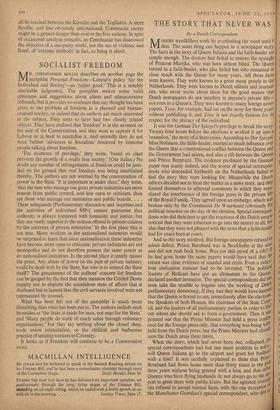SOCIALIST FREEDOM
MR. CHRISTOPHER HOLLIS describes on another page the pamphlet Personal Freedom—Labour's policy 'for the Individual and Society'—as 'rather good.' This is a notably charitable judgement. The pamphlet makes some valid criticisms and suggestions about aliens and administrative tribunals. but it provides no evidence that any thought has been given to the problem of freedom in a planned and bureau- cratised society, or indeed that its authors are much interested in the subject. They seem to have had two closely related objects. They have realised that 'freedom' is at the moment on the side of the Conservatives, and they want to capture it for Labour or at least to neutralise it. And secondly they do not want further 'advances to Socialism' hindered by tiresome people talking about freedom.
The existence of privilege,' they write, 'based on class prevents the growth of a really free society.' (Our italics.) No doubt any number of infringements of freedom could be justi- fied on the ground that real freedom was being established thereby. The authors are not worried by the concentration of power in the, State. 'It is important to make clear,' they write, `that the men who manage our great private industries are more remote from public control, and less open to criticism, than are those who manage our ministries and public boards. . . . These safeguards [Parliamentary discussion and inquiries and the activities of individual MPs] cannot guarantee that authority is always tempered with humanity and justice, but they are vastly superior to the redress offered to private citizens by the concerns of private enterprise.' In the first place this is not true. Many workers in the nationalised industries would he surprised to leant that since nationalisation these industries have become more open to criticism; private industries are not monopolies and do not therefore possess the same power as do nationalised industries. In the second place it utterly misses the point. Any abuse of power on the part of private industry could be dealt with by the State, but who is to control the State itself? The genuineness of the authors' concern for freedom can be gauged by the fact that they mention the Crichel Down inquiry not to deplore the scandalous state of affairs that it disclosed but to lament that the civil servants involved were not represented by counsel.
What has been left out of the pamphlet is much more disturbing than what has been put in. The authors include such bromides as 'the State is made for man, not man for the State,' and 'Many people do work of much value through voluntary organisations,' but they say nothing about the closed shop, trade union intimidation, or the childish and barbarous practice of sending workers to Coventry.
'It looks as if Freedom will continue to be a Conservative word.


































 Previous page
Previous page